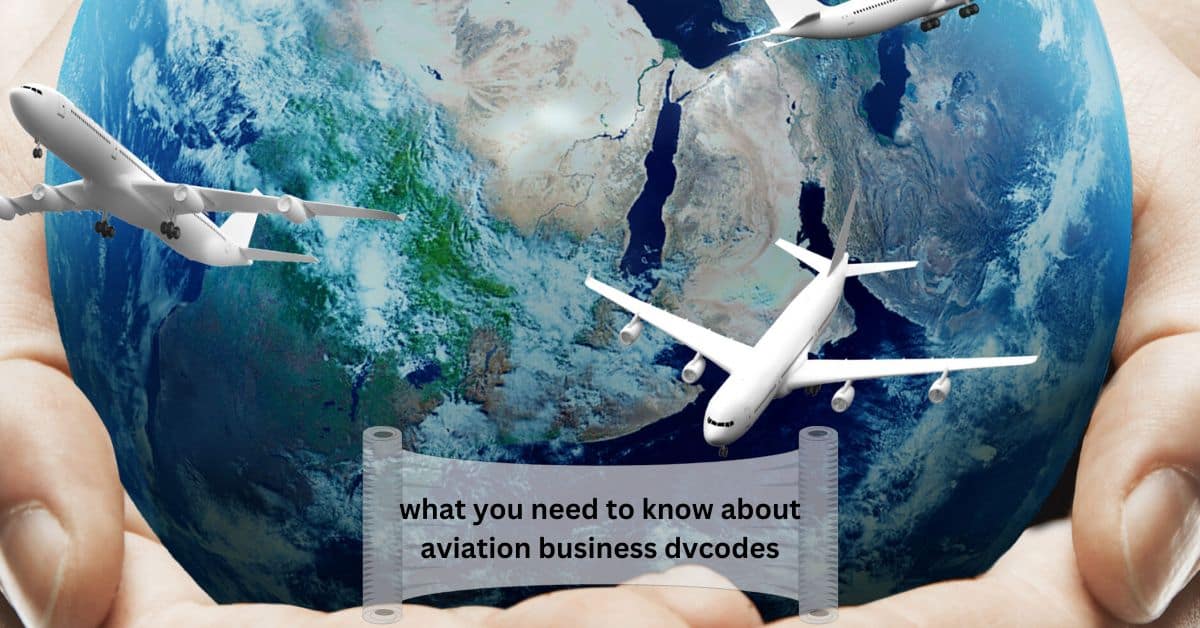Aviation business Dvcodes are essential codes used by airlines and aviation companies to identify flight routes, destination airports, aircraft types, and more. Understanding them is crucial for efficient operations and effective communication within the aviation industry.
Aviation business Dvcodes are like secret keys unlocking the intricate world of flight operations, offering insights into routes, destinations, and aircraft specifics. Delving into them unveils the hidden mechanics behind smooth air travel, inviting you to explore the fascinating realm of aviation logistics.
Introduction to Aviation Business Dvcodes!
Aviation Business Dvcodes serve as fundamental identifiers utilised within the aviation industry for various purposes.
These codes, composed of eight digits, play a crucial role in identifying specific flight routes, destination airports, aircraft types, and other pertinent information necessary for efficient operation.
Understanding the significance and functionality of dvcodes is essential for businesses operating within the aviation sector.
By comprehending how these codes operate, companies can effectively manage their operations, streamline communication, and ensure compliance with industry standards and regulations.
Dvcodes facilitate seamless transactions and communication processes, enabling airlines and aviation companies to track deals, discounts, and services efficiently.
As such, grasping the fundamentals of dvcodes is imperative for any entity involved in aviation operations.
This introductory overview aims to provide insights into the essential role played by dvcodes in the aviation industry, laying the foundation for further exploration and understanding.
What Are Dvcodes?

Dvcodes, short for “Data Verification Codes,” are alphanumeric identifiers extensively used in the aviation industry to categorise and identify various entities and aspects of air travel.
Comprising eight characters, these codes serve as unique markers for airlines, airports, aircraft manufacturers, and service providers.
The first four digits of a dvcode denote the type of business, while the subsequent four digits specify the particular entity within that category.
For instance, air carriers, airports, and aircraft manufacturers each have distinct sets of dvcodes tailored to their specific classification and identification needs.
These codes play a vital role in facilitating seamless communication, transaction processing, and operational management within the aviation sector.
Understanding the structure and function of dvcodes is essential for stakeholders in the aviation industry to navigate complex processes and ensure accurate identification and communication across various business functions.
Read: Get_ready_bell: Client_pulse – A Comprehensive Guide!
Air Carrier Codes – Passenger and Cargo Airlines!
- Definition: Air carrier codes are specific identifiers used to distinguish between different airlines in the aviation industry.
- Passenger Airlines: These codes identify airlines that primarily transport people. They use codes beginning with “1001”.
- Cargo Airlines: These codes are for airlines that mainly transport goods. They use codes starting with “1002”.
- Code Structure: Each code is eight digits long, with the first four digits indicating the type of carrier (passenger or cargo) and the last four identifying the specific airline.
- Example: For instance, American Airlines might have the code “1001AA”, while a cargo airline like FedEx could be coded as “1002FD”.
- Usage: These codes help in booking, tracking, and managing flights and services.
- IATA Codes: The International Air Transport Association (IATA) assigns three-letter codes that are commonly used in passenger ticketing.
- ICAO Codes: The International Civil Aviation Organization (ICAO) provides four-letter codes used in flight operations and air traffic control.
- Efficiency: Using these codes streamlines communication and operations in the aviation industry, making it easier to manage flights.
- Global Standard: These codes are recognized worldwide, ensuring consistency and understanding across different regions and languages.
- Operational Management: Air carrier codes facilitate efficient scheduling, maintenance, and logistical support for airlines.
- Safety and Security: They contribute to safety by ensuring accurate tracking and identification of all aircraft.
- Historical Data: Airlines use these codes to maintain historical data on flights, passengers, and cargo.
- Customer Service: For passengers and cargo clients, these codes ensure clarity and accuracy in bookings and tracking.
- Industry Compliance: Air carrier codes help airlines comply with international regulations and standards, promoting a safe and efficient aviation environment.
How Dvcodes Facilitate Operations!

Dvcodes play a crucial role in streamlining and simplifying aviation operations. By providing standardized identifiers for airlines, airports, and flight routes, they eliminate confusion and ensure everyone in the industry speaks the same language.
This standardization improves communication between different aviation entities, such as air traffic control, airlines, and ground services, making coordination smoother and more efficient.
Dvcodes also help in accurate flight scheduling and tracking, reducing errors and delays. They enhance security by allowing for precise identification of aircraft and their movements.
Additionally, these codes support regulatory compliance by ensuring that all operations adhere to international standards. Overall, Dvcodes make the complex world of aviation more manageable and efficient.
Read: How2Invest – Your Ultimate Guide to Smart Investing
Benefits of Using Dvcodes!
- Streamlined Communication: Dvcodes simplify communication between different aviation businesses, ensuring everyone understands the same terms and identifiers.
- Operational Efficiency: By using standardized codes, airlines and aviation companies can manage operations more smoothly and efficiently.
- Improved Accuracy: Dvcodes help reduce errors in booking, scheduling, and tracking flights, leading to more accurate records.
- Global Recognition: These codes are recognized worldwide, facilitating international operations and partnerships in the aviation industry.
- Enhanced Security: Dvcodes contribute to better security by providing clear identification of airlines, airports, and aircraft.
- Cost Savings: Standardizing codes can reduce administrative costs and improve overall financial efficiency for aviation businesses.
- Easier Compliance: Using dvcodes helps airlines and aviation companies comply with international regulations and standards more easily.
- Better Data Management: Dvcodes enable efficient data collection, storage, and analysis, which is crucial for operational planning and decision-making.
- Customer Convenience: Passengers and cargo clients benefit from clearer, more reliable booking and tracking information.
- Scalability: As businesses grow, dvcodes provide a scalable system that can adapt to increased complexity and volume.
- Faster Problem Resolution: Standardized codes make it easier to identify and resolve issues quickly, minimizing disruptions.
- Consistent Training: Training employees on a standardized system of codes ensures consistency and understanding across the organization.
- Enhanced Marketing: Clear, recognizable codes can be used in marketing and branding, helping to establish a strong identity in the industry.
- Better Partner Collaboration: Dvcodes facilitate collaboration with partners and service providers by ensuring everyone uses the same identifiers.
- Historical Analysis: Using standardized codes allows for better analysis of historical data, helping businesses improve their services and operations over time.
Getting Started with Dvcodes!

Starting with Dvcodes involves understanding their role in the aviation industry. These eight-digit codes are essential for identifying flight routes, airports, and aircraft.
To begin, familiarize yourself with the different types of Dvcodes used by airlines, airports, and service providers. Learn the specific codes for major airports and airlines you frequently interact with.
Utilize online resources and databases that list these codes for easy reference. Integrate Dvcodes into your booking and scheduling systems to streamline operations.
Regularly update your knowledge as codes can change with new regulations or updates in the industry. Engaging in aviation forums and communities can also provide valuable insights and tips from experienced professionals.
Read: Pépico – taste the difference!
FAQs:
1. What are the main types of dvcodes used in the aviation industry?
The main types of Dvcodes in the aviation industry include those for air carriers, airports, aircraft manufacturers, and service providers. Each type has its own unique set of codes for identification and categorization.
2. How do dvcodes contribute to operational efficiency in aviation businesses?
Dvcodes enhance operational efficiency in aviation businesses by streamlining communication and facilitating quick identification of flight routes, aircraft types, and service providers. They provide a standardized system for data management and exchange within the industry.
3. Where can I find resources to learn more about dvcodes and their applications?
You can find resources to learn more about dvcodes and their applications on aviation websites, forums, and databases such as ICAOcodedb.com and FlightAware.com. Additionally, joining online aviation communities like Airliners.net and Avsim.net can provide valuable insights from experienced aviators.
4. Are there any security measures in place to protect dvcodes and aviation data?
Yes, dvcodes utilize highly secure platforms to protect aviation data from unauthorized access, ensuring the safety and integrity of information.
Conclusion
In conclusion, mastering aviation business Dvcodes is pivotal for navigating the complexities of the industry and ensuring seamless operations. With a deep understanding of these codes, aviation professionals can streamline processes and enhance communication, contributing to safer and more efficient air travel.
Read more:



